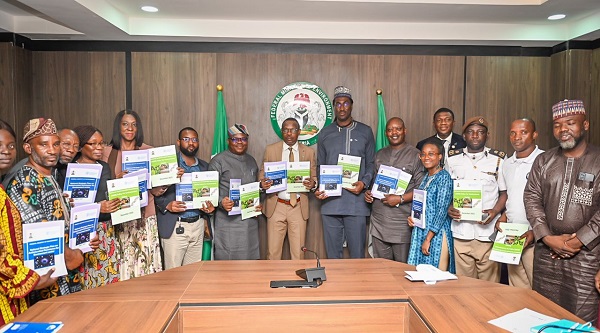
The Federal Government has launched a national antimicrobial policy and strategic plan targeting AMR in the environment sector in the ongoing fight against antimicrobial resistance (AMR) in Nigeria.
The Minister of State for Environment, Dr. Iziaq Salako emphasised during the launch and ministerial briefing on the AMR policy in Abuja that antimicrobial resistance is not only a public health threat but also has significant implications for global economic wellbeing and security, affecting both developed and developing countries.
According to Dr. Salako, the World Health Organisation lists AMR as one of the top ten threats to global health. The United Nations Environment Programme (UNEP) identifies AMR as a global crisis that must be understood and addressed in the context of the triple planetary crisis.
“The 2022 Global Antimicrobial Resistance and Use Surveillance System (GLASS) report highlights alarming resistance rates among bacterial pathogens causing the deadliest infections, with other pathogens like viruses, fungi, and protozoa also becoming resistant,” Salako noted.
“This report shows that the AMR threat is growing at an alarming rate, making treatment challenging with longer hospital stays, increased mortality, and higher healthcare costs. The World Bank estimates that AMR could result in an additional US$1 trillion in healthcare costs by 2050 and US$1 trillion to US$3.4 trillion in GDP losses per year by 2030,” he added.
Salako highlighted several activities the Federal Ministry of Environment has undertaken to lay a solid foundation for AMR surveillance in the environment sector. These activities include:
– Conducting an AMR situation analysis in the environment sector in 2020, including laboratory and capacity needs assessment of environmental reference laboratories domiciled with NESREA, paving the way for setting up AMR surveillance in the environment sector.
– Establishing the Integrated National Environmental Health Surveillance System (INEHSS) in 2022 for real-time environmental health and sanitation data collection and processing for informed policy decisions, planning, monitoring, evaluation, early warning signals and response to environmental health challenges, including disease outbreaks. The INEHSS provides a premise for AMR surveillance in the environment, considering the unsound release of antimicrobial residues.
He assured that the nation stands to gain socio-economic benefits from the effective implementation of the AMR policy through improved public health and increased productivity. Incorporating AMR surveillance into the INEHSS will provide timely alerts on AMR spread, enabling early detection of drug resistance and timely response. This will, in turn, reduce disease burden and improve general health outcomes.
Additionally, Salako stressed that AMR surveillance will enable the detection and tracking of antimicrobial residues and resistance genes in environmental media (water, air, and soil), thereby reducing environmental pollution. The country will save on the cost of cleaning up and remediating AMR-polluted sites such as industrial areas, agricultural areas, waste management sites, and heavy metal-polluted sites.
AMR surveillance will ensure wildlife is not harmed by antimicrobials and drug-resistant microorganisms in the environment. This ultimately protects human health by reducing the risk of zoonotic disease outbreaks.
He emphasised that developing this policy will further enhance Nigeria’s capacity to meet her obligations under international health regulations and other global health security agreements to which she is a signatory. This is in line with the Renewed Hope mantra of President Bola Ahmed Tinubu’s administration “to improve Nigeria’s standing and dignity among the comity of nations.”
In his address, the Food and Agriculture Organisation (FAO) representative ad interim in Nigeria and ECOWAS, Mr. Koffy Dominique explained that the antimicrobial resistance scourge affects humans, animals, plants, and the environment.
He revealed that these documents align with the FAO Nigeria Country Programming Framework (2023-2027). According to Dominique, it is estimated that 10 million people will die annually by 2050 and the economies of nations will be negatively affected if this challenge is not mitigated.
He encouraged countries to implement actions that will reduce and control the antimicrobial resistance scourge. “Antimicrobial resistance, which is a One Health issue, needs to be tackled by all sectors. It is for this reason that the FAO in 2022 supported the Federal Ministry of Environment to develop the National AMR Policy and the National Strategic Plan (2023-2027),” he said.
“This support was also to assist in enhancing the capacity and capabilities of the environment sector to participate actively in the development and implementation of multi-sectoral and interdisciplinary AMR control plans at the national and subnational levels,” he added.
Dominique implored the Federal Ministry of Environment and all stakeholders to resolutely sustain the fight against AMR. “This is important in ensuring that all relevant environmental stakeholders are sensitised and participate in the fight against AMR in the environment, specifically and generally at the animal-human interface.”
“It is anticipated that implementing the National Strategic Plan on AMR for the Environment Sector will aid in generating data on AMR indices in the environment, strengthening the regulation of antimicrobial discharges in the environment and establishing standard parameters for monitoring and controlling antimicrobials,” he concluded.

